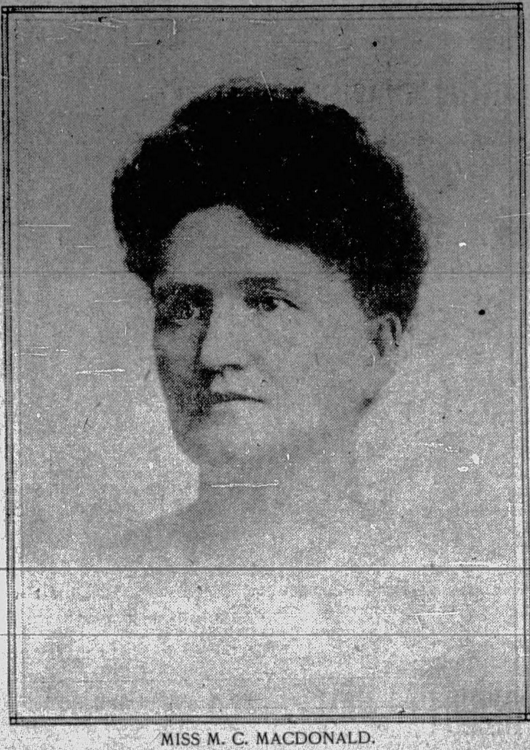Introduction
In the summer of 1913, amongst the discussion concerning the lack of Police Officers in Victoria due to budgetary constraints, there was a large push to see the appointment of two female police officers in the Victoria Police Department. Groups advocated the role of Police Women would be beneficial and could provide better care in situations regarding the youth especially young girls.
The public discussion brought a consensus between the Police Commissioners and the Mayor to hire an additional six police officers, with two being women.[1] Four prominent women from the local communities applied for the two positions in May, 1913: Mrs. Clayards, the widow of the very popular and missed Sergeant Clayards; Miss McDonald, a nurse at the Royal Jubilee Hospital; Mrs Ferris, who had previously acted as a matron at the police station; and Miss Gough, who had experience in the settlement work in England, before she moved to Victoria.[2]
On November 6 1913, the Board of Police Commissioners selected Mrs. Clayards and Miss McDonald to act as members of the Police Department, with the main task of protecting the young, especially girls.[3] These appointments also allowed the Victoria Police Department to handle more difficult cases which could be better attended to by women, which was considered by the public and the Police Commissioners to be a necessity. Mrs. Clayards and Miss McDonald were formally sworn in on November 12, 1913, and officially became fully fledged members of the Victoria Police Department.[4]
Mrs. Clayards, and Miss McDonald decided it would be best not to wear uniforms to appear as more approachable members, while quietly keeping their eyes open to see how they can be of use to the women and children, behind which they have the authority of the law.[5]
The positioning of the two female officers helped against gendered prejudice, which was common during this time period.
Daily Duties
The two new officers work eight hours a day, supervising the streets and parks, as well as being present and attentive to any investigations of private cases or trials concerning women or children. The also opened a form of communication and dialogue with mothers who were anxious about their daughters spending their evenings in town, many of whom would not feel comfortable consulting a male officer.[6] The Daily Colonist reported,
“A little talk with Miss McDonald will convince any doubter that there is plenty for the new officers to do and that the community will be the better for their services in the first place no one can speak to this gentle voiced women without feeling that her attitude is one of helpfulness and friendliness, and that only the cruel and the wicked need dread either her or her co-workers.”[7]
Miss. McDonald
Miss McDonald, was a professional nurse at the Royal Jubilee Hospital since 1903, retiring two weeks in order to join the Victoria Police Department, in October 1913.[8] Her medical background gave her an insight to dangerous qualities and traits that can lead to issues later on in life, such as smoking. Miss McDonald, took it upon herself to uphold the law against the sale of cigarettes to minors, to which the local newspaper the daily colonist, said, “Reputable tobacco dealers who keep the law as well as all parents will be glad of the activity of the officers in this direction so will the boys when they grow older”.[9]
Miss McDonald was an advocate for an industrial school for girls (Juvenile Detention Centre). With her support, Vancouver opened up an Industrial Home for convicted young women where they would be provided a home atmosphere, training in sewing, cooking, domestic service, and reading if necessary.[10] The young boys would be sent to the Boys Industrial home in New West Minister.[11]
In the summer of 1914, Miss McDonald was appointed to the position of inspector under the Shops Regulation Act, which was passed in 1912. The act provided for the appointment of inspectors but this step was never taken by the city due to the shortage of officers and the financial stringency, as a result the terms of the statute were inoperative. She, along with another inspector appointed, immediately visited all premises covered by the act, such as all retail, wholesale shops, booths, or warehouses which employed assistants, and were responsible for notifying the proprietors of any contravention of the statute and ensure compliance. [12]
Written by Clayton King
References:
[1] Urge Policewomen For Local Force, The Daily Colonist. Saturday March 29, 1913. Pg. 10 (Accessible http://archive.org/stream/dailycolonist55y91uvic#page/n8/mode/1up)
[2] Four Women Apply, The Daily Colonist, Saturday May 3 1913 pg. 14. (Accessible http://archive.org/stream/dailycolonist55y121uvic#page/n12/mode/1up)
[3] Women To Do Police Duty in Victoria, The Daily Colonist. Thursday November 6, 1913. Pg. 5(Accessible http://archive.org/stream/dailycolonist55y280uvic#page/n3/mode/1up)
[4] Police Women Sworn, The Daily Colonist. Thursday November 13, 1913. Pg. 6. (Accessible http://archive.org/stream/dailycolonist55y286uvic#page/n4/mode/1up)
[5] Our Women Police, The Daily Colonist. Sunday December 14, 1913. Pg. 8. (Accessible http://archive.org/stream/dailycolonist56y4uvic#page/n7/mode/1up/search/miss+mcdonald+police+polic)
[6] Ibid.
[7] Ibid.
[8] High Honor Paid retiring Matron, Daily Colonist. August 31 1913 pg 10. http://archive.org/stream/ dailycolonist55y224uvic#page/n8/mode/1up/search/miss+macdonald
[9] Our Women Police, The Daily Colonist. Sunday December 14, 1913. Pg. 8.
[10] Work of Victoria’s Two Police Women, The Daily Colonist. May 7, 1914. Pg. 5. (Accessible http://archive.org/stream/dailycolonist56y125uvic#page/n3/mode/1up/search/mr+clayard+mrs)
[11] Ibid.
[12] Will State Type of Pavement Desire, The Daily Colonist. July 7 1914. Pg. 9 (Accessible http://archive.org/stream/dailycolonist56y177uvic#page/n7/mode/1up/search/police+woman)
